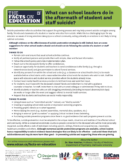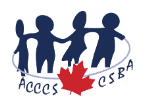What can school leaders do in the aftermath of student and staff suicide?
School leaders have a responsibility to select evidence-based strategies
Suicide postvention refers to activities that support the grieving process and may help prevent suicide contagion among family, friends and classmates of a student or teacher who dies from suicide. While this is a challenging topic for any educator as waves of strong emotions take grip on a school community, acting primarily on emotions is not likely to bring optimal outcomes.
Although evidence on the effectiveness of suicide postvention strategies is still limited, here are some suggestions for what school leaders should and should not do following the suicide of a student or staff member:
THINGS TO DO
- Remain calm and ensure that usual school activities continue.
- Notify all pertinent persons and provide them with simple, clear and factual information.
- Follow the school’s policy and crisis implementation plan.
- Reach out to the deceased’s family to offer condolences.
- Create an opportunity for students and teachers to send condolences to the family (e.g. through a remembrances book) and give permission to attend funeral services.
- Identify key persons from within the school and a site (e.g. a classroom or school health clinic) to be made available before school starts until a reasonable time after school ends for students who wish to talk. Staff the space with educators and student service providers whom the students already know.
- Contact local mental health services providers to let them know and seek their input.
- For students, touch base with the deceased’s closest friends and invite them to chat with a guidance counselor or teacher. For staff, invite them to chat with a trusted colleague or administrator if they wish to do so.
- Identify students or teachers who are still struggling emotionally (including increased absences/sick days) six weeks or longer after the event and suggest referral to mental health services.
- Request that students and teachers use social media responsibly.
THINGS TO AVOID
- Using phrases such as “committed suicide.” Instead, use “died by suicide.”
- Creating or applying school-wide suicide or depression screening programs.
- Providing graphic details as to what happened.
- Memorializing the event (e.g. student assemblies, memorial sites, speakers, etc.)
- Bringing in external “grief counselors” or applying Critical Incident Stress Debriefing.
- Purchasing suicide prevention programs since there is no good evidence that such programs prevent suicide.
To be effective, suicide postvention must be adapted to the unique needs, situations and realities of the affected school and community. While a conservative estimate counts six people connected to the deceased who will be most personally impacted, suicide affects a web of individuals including parents, siblings, friends and acquaintances, classmates, healthcare providers and others.
Although numerous suicide postvention programs are available, school leaders have a responsibility to select evidence-based strategies that are likely to be effective – and avoid those that lack solid evidence and may do more harm than good – in preventing suicide and supporting those who are grieving.
ADDITIONAL INFORMATION RESOURCES
- TeenMentalHealth.org: Suicide
- Ontario Center of Excellence for Child and Youth Mental Health. (2015). Evidence in-sight: suicide postvention programming.
- Media Guidelines for Reporting on Suicide
- Ashraf Kagee. (2002). Concerns about the effectiveness of critical incident stress debriefing in ameliorating stress reactions. Critical Care.
- Francesco Pia and co-authors (2011). ACFASP Review: Critical Incident Stress Debriefing.
- Samaratins UK: Suicide Postvention in the Workplace
REFERENCES
Kutcher, S. (2018). Suicide Postvention in Schools: Addressing an emotional issue using best available information and critical thought. CAP Journal.
Szumilas, M. & Kutcher, S. (2011). Post-suicide Intervention Programs: A Systematic Review. Can J Public Health, 102 (1), 18-29.



